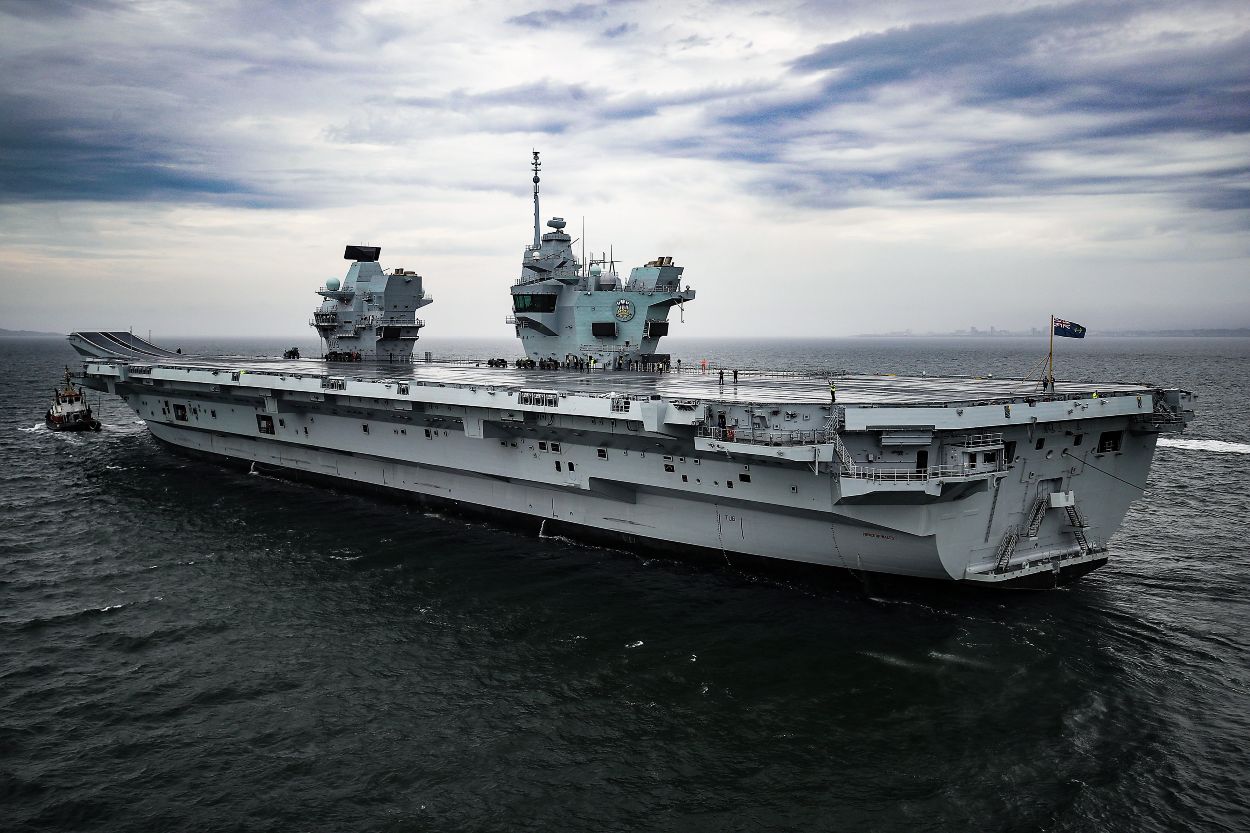As bilateral cooperation between Japan and the United Kingdom grows, the Royal Navy’s carrier, HMS Prince of Wales, currently stationed in Portsmouth, is set to visit Japan next year as part of military drills to be conducted in the Indo-Pacific.
The British government announced on April 10 that it will begin conducting regular joint military drills in the Indo-Pacific region in 2025 in close collaboration with allies, the United States, and Japan.
Although the UK did not refer to any particular state, the move is supposedly aimed at deterring China in the region. A press release published by the UK Ministry of Defense (MoD) stated, “The trilateral exercises will build on previous operations between the three countries—underlining the UK’s commitment to the Indo-Pacific.”
According to British Defense Secretary Grant Shapps, the proposed trilateral exercises would deliver “a strong message to anyone who would seek to undermine the rules-based international order…Our defense relationships are not limited by distance, and we stand ready to respond to any threat around the globe.”
Shapps also noted that the Royal Navy will dispatch a carrier strike group to the region under the command of the HMS Prince of Wales. During its visit to the Indo-Pacific region, the carrier will make a port call to Japan. This underscores the burgeoning military cooperation between the two countries in recent times.
Shapps announced the deployment of a British Carrier Strike Group (CSG) to Japan in December last year while he was visiting Japan’s Yokosuka naval base. He noted that the carrier group would work alongside allies to ensure peace and stability in the region. However, the secretary stopped short of naming these allies at that time.
According to reports, the deployment plan was decided in May in Hiroshima, western Japan, when the city hosted a Group of Seven conference. The prime ministers of Japan, Fumio Kishida, and Britain, Rishi Sunak, participated in the conference.
Hello Japan!
こんにちは 日本
🇬🇧 🇯🇵 #CSG21 #Yokosuka @UKinJapan @JMSDF_PAO @jmsdf_pao_eng pic.twitter.com/QCzb6KSRpp
— HMS Queen Elizabeth (@HMSQNLZ) September 4, 2021
The Japan visit will be the first by a British carrier strike group to the region since the carrier Queen Elizabeth moored in Yokosuka, southwest of Tokyo, in 2021.
The decision to hold the trilateral military drills in the region comes as concerns over Beijing’s maritime assertiveness have led London to bolster its defense cooperation with like-minded nations, such as Japan, and increase its commitment to the Indo-Pacific region.
However, when Britain first hinted at a carrier deployment late last year, it was mocked by Chinese military experts who drew attention to the underlying technical issues plaguing the British aircraft carriers that have not been on any major deployment in the recent past.
“The British Royal Navy currently has two aircraft carriers, the HMS Queen Elizabeth and the HMS Prince of Wales, both of which have been plagued with problems and have experienced serious water leakage incidents, earning them the nickname “sieve ships” by foreign media,” read a Global Times editorial, Chinese-state media.
On its part, the UK remains steadfast in its decision. The British government also stated that it would place its approach to the Indo-Pacific “on a long-term strategic footing” and make the area “a permanent pillar” of its international policies in its 2023 guidelines for diplomacy and security policy.

As Britain looks to expand into the Indo-Pacific region with an eye on China, Japan has emerged as a natural partner owing to its strategic location and traditional security relationship with another British ally, the United States. The close cooperation bodes well for Japan, which has been bolstering its military in a departure from its pacific posture.
Britain’s Deepening Partnership With Japan
With an eye on the mounting threat from China, Japan and the United Kingdom decided to deepen defense ties in November last year, including stronger defense-industrial cooperation and joint efforts on emerging security domains like cyberspace and space.
After the “two-plus-two” meetings held in Tokyo (the two-plus-two talks saw Japan’s foreign minister Yoko Kamikawa and defense minister Minoru Kihara meeting with their British counterparts, James Cleverly and Grant Shapps), both countries’ foreign and defense ministries stated that they intended to increase military coordination and interoperability by carrying out “more frequent and complex joint exercises.”
In January this year, the two sides also signed a Reciprocal Access Agreement (RAA). British Prime Minister Rishi Sunak and his Japanese counterpart Fumio Kishida signed the defence agreement in London which will essentially allow the countries to deploy forces on each other’s soil.
“This Reciprocal Access Agreement is hugely significant for both our nations — it cements our commitment to the Indo-Pacific,” Sunak said in a statement.
The agreement between Japan and the UK has been seen as an example of Tokyo’s efforts to fortify its alliances against threats from China, which it has dubbed the “greatest strategic challenge ever” to national security. Military experts have warned that Japan’s geographical proximity to Taiwan might drag Japan into a cross-strait conflict triggered by a potential invasion of the self-ruled state by Beijing.
Besides basing troops and port visits by British carriers, Japan, the UK, and Italy are developing a next-generation fighter jet known as the ‘Global Combat Aircraft Program.’ An official pact was signed in December last year. Japan is also looking to export the aircraft in the future.
Further, some recent reports also hinted at Japan’s inclusion in the trilateral AUKUS alliance between Australia, the UK, and the US. It appears that cooperation between Tokyo and London is here to stay.
- Contact the author at sakshi.tiwari9555 (at) gmail.com
- Follow EurAsian Times on Google News